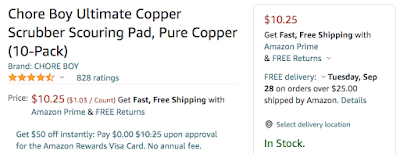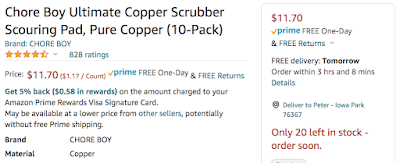I’m finding, more and more often, that when I look up products on Amazon.com, the price advertised will depend on whether or not I’m logged in to the site. Just yesterday, for example, I looked up a cleaning product, a 10-pack of Chore Boy scourers. The exact URL used in both cases was this:
https://www.amazon.com/Chore-Boy-Cer-Scouring-Pack/dp/B007VGICGK
When I was not logged in, and using the Brave browser, this is what was returned (clickit to biggit):
When I was logged in, using the Chrome browser but the identical URL, I got a different price:
I contacted Amazon’s customer support chat, and asked the lady who responded why I was getting a different price like that. She could not answer my question, and asked me to submit screenshots of the differences to the customer service department. I’ve done so, but haven’t yet had any response.
Even more intriguing, when I went to the same URL this morning, one of the prices were different. “Not logged in” still showed a price of $10.25, but “logged in” showed $11.50.
That’s not the only product where I’ve observed such differences in pricing, depending on whether or not I’m logged in to Amazon’s Web site. Are they assuming that loyal customers can safely be charged more, because we won’t actually compare prices? Are they trying to attract what their algorithm might consider “new” (or at least not-logged-in) customers with lower prices, only to spring a switcheroo on them when they do log in?
Can anyone suggest what’s going on with Amazon’s pricing algorithm? Something ain’t right, for sure! If you’ve noticed anything similar, please let us know about it in Comments, giving the specific product URL if possible. It’ll be interesting to find out how widespread this problem is becoming.
Peter


I've noticed that Amazon's prices aren't that good anymore. Yeah, I avoid traipsing off to a distant store but Wal-Mart is getting into the game as well. Wal-Mart prices are often cheaper than Amazon.
camelcamelcamel dot com is a website that tracks Amazon prices on a specific item over time. That can be an interesting site to watch. It also lets you go look at historical prices of an item you are considering to see if you are getting hosed or not.
Also, if you add an item to your cart and them move it to "save for later" you can watch the price change up and down every time you come back. Usually only a couple pennies, but sometimes large changes both up and down (usually up) that show that Amazon is playing with that pricing continuously.
The only thing I've noticed is Wallyworld will always mirror Amazon prices to the penny. Amazon doesn't always have the best prices.
I've been told that those on Amazon Prime are charged higher prices. It's easy for them to adjust prices for those with "free delivery"…. in a world of computerized everything.
@BC, spot on. The camelcamelcamel.com suggestion is an excellent one. It allows one to see the price history charted over time (often years). It usually shows that a given item will periodically go on sale, often at deeply discounted prices for short periods of time. This is probably a function of inventory control measures. In any case, it informs your target price, and once the price hits it (or goes lower) you get an automatic email.
I set an alert for a device about 1.5 years ago, and it just recently dropped below my target price. I bought it, saving well over $100. Since buying it, the price has popped right back up again after a few days on sale.
@Bob: Yeah. So much for "free shipping" – and the $120 per year that Amazon charges Prime customers for the privilege. I guess they want more than a mere pound of flesh out of us.
Nothing new there… I've been a customer at Amazon since 98 and while I was buying a lot several years ago at another University I had to check 2-3 accounts to try to get the one "good" price as they changed a LOT from one to another. Annoying and the whole "Prime" thing was supposed to eliminate the variance but clearly that is not or no longer the case…
It's 'price discrimination'. Amazon is trying to maximize profits by charging as much as it thinks you will pay. There was a brouhaha in 2000 when they were caught at it, then they dropped it until the furor died down. You'll also sometimes see different prices from different browsers or operating systems.
Search: https://duckduckgo.com/?q=amazon+price+discrimination
It's done by many companies (https://www.washingtonpost.com/posteverything/wp/2014/11/03/if-you-use-a-mac-or-an-android-e-commerce-sites-may-be-charging-you-more/) and is apparently legal.
I believe there are all kinds of price manipulations by Amazon. I have several times been watching series on Prime that mysteriously get placed in a new "subscription" channel after I watch 3 or 4 episodes. Even one that was on a subscription channel that got put into a different subscription channel! I don't think that is an accident. Unfortunately, without a whistle-blower, how can we know?
The worst part is Amazon is so $%^! convenient. I don't know how to quit you…
Odd, not seeing it here (checked link in normal window, logged in, and private window, not logged in and they are the same for me).
The shipping might be the issue, though I am quite sure shipping to me is more expensive the shipping it to you.
I'm afraid you're late to the party on this, Peter, Amazon has been doing this for years – it's called "dynamic pricing" and they – very quietly – admitted to it a long time ago.
Camelcamelcamel.com is an extremely useful tool, as are the various "live" price shopping tools (Invisible hand, Capital One's tool, etc.) to ferret out better prices.
Pro Tip: Some Amazon pages have a hyperlink for "find a lower price?" I have no idea where that goes, it's possible a human looks at it but I doubt it, …if one sets a camel alert for a lower price, and finds a lower price elsewhere, give the link a try. It must be the exact same item, with free shipping, or nothing will happen. But if the Amazon algorithms like it they might drop the price. Briefly. Very briefly (which is what commenters above are pointing out when camel shows that "downward spike" on the pricing chart – the price got cut for a day, maybe two, or sometimes only a few hours (I've gotten a deal this way a couple times when the price dropped for only a few hours, so make sure camel can reach the email on your phone and if you get the alert act
immediately.)
Most people think "people" run Amazon; they're wrong. Amazon is run by AWS (Amazon Web Services) algorithms. True, "people" write many of those algorithms (Amazon's AI systems write most of them) but it's the software in control.
Amazon admitted some years ago – I think it was actually Bezos who said it – that the goal of Amazon's retail business was to break even – AWS is the Cash Cow. Think that through – Amazon retail exists to collect data for AWS – you're not the "customer," you're the product. FYI, ever been on Amazon, logged off, done other stuff on the computer, then gone back to Amazon and found your shopping cart is still availble? Amazon sets "persistent cookies" to enable that.
Pro Tip #2 – RE: higher prices when logged in; without logging in, try putting something in the cart, you'll have to log in at checkout but most of the time that will "hold" the lower price through checkout.
Pro Tip #3 – when shopping online LOOK for the "find a lower price?" hyperlink on EVERY site you visit; I recently saved $45 each on a set of tires that way. Most sales outlets think their competition is 2 miles down the street when it's actually 2 mouse clicks away, but some do understand it.
It's $10.25 for me, plus $10.26 shipping to Australia.
Reckon I'll just purchase locally.
Peter, I have found the same on consumables for my shop space- rags, paint brushes, respirator cartridges and adhesives so far. I use my laptop for amazon orders and my phone to look it up, and have seen the difference between the two.
I bought a prime membership about 10 years ago. It just keep renewing itself even though I have tried several times to stop it.
I can't loose from it. Oh well. I do use it for books so it is not like I don't use it.
Not sure it actually pays for itself though. You can hit retailers that use there own shipping rules. Even if you pick over nite. I suppose a week could be over nite to some people.
No, amazon is a gorilla and it does at it pleases.
third time typing this in. each time it gets pithier…
different seller. click the "New (14) from $10.07 & FREE Shipping" link and you'll see the cheaper option there. amazon tends to show lower priced sellers when not logged in, higher-rated sellers to logged-in.
the camel is indeed awesome.
Every computer has a footprint/ID, can't remember the technical name, when you enter their webpage they know immediately who you are especially when you log in. Airling ticket systems same thing as well as anything else you click to to purchase something. That id is how law enforcement knows the computer inputing info to the web whether social media or other wise.
I haven't seen this, but I use Honey (browser add-on) to look at an item's price over time to try not buying at a peak in price. I also comparison-shop on other sites, because Amazon isn't the cheapest all the time. Even within Amazon I shop around, as there are different sellers… plus, as we talked about not long ago, finding an item in the "Amazon Warehouse" is usually the best bargain.
When you are logged in as a Prime member, you are seeing the lowest price for the product WITH Prime Shipping. There are sellers with lower prices, but you will either pay for shipping, or it won't ship as quickly.
That said, once I noticed that some of the items I was buying were being shipped from WalMart, I started buying directly from there instead and started saving money.
I've found that Amazon (soon to be et al) tracks your Internet IP based on email location regardless of your logged in status. It will also use location to adjust your pricing.
The previously mentioned Honey add-on is a very useful tool.